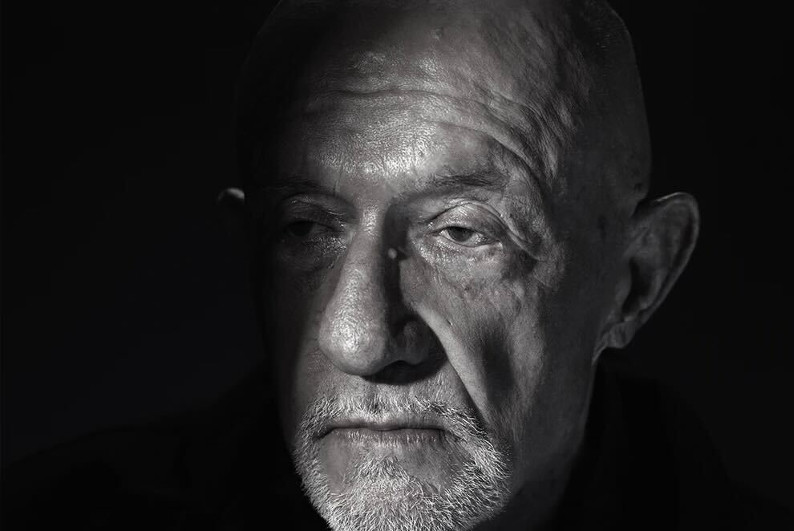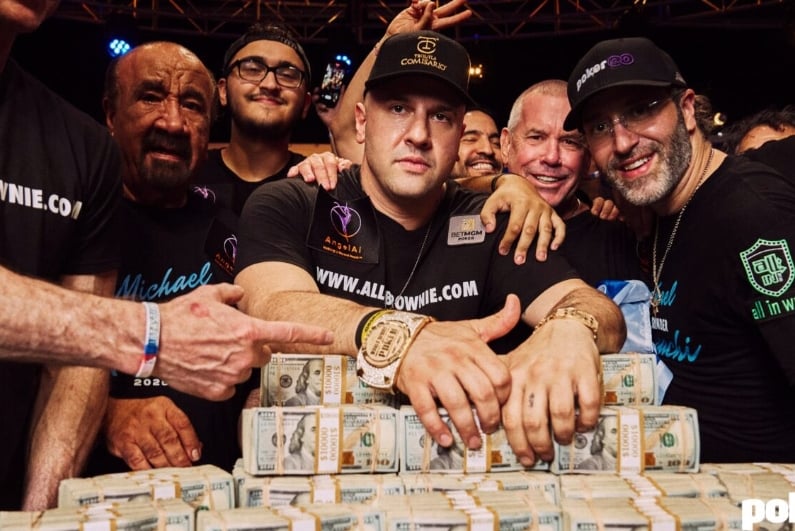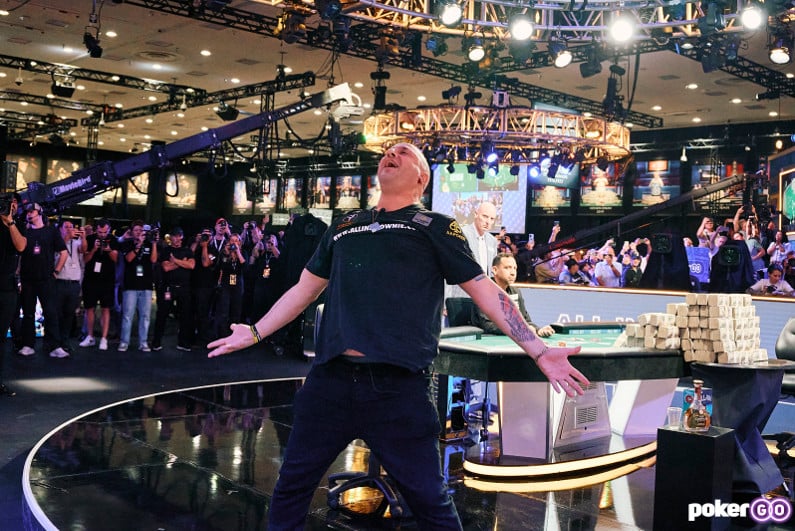To angle the angler?
“Moral of the story is: I chose a half measure when I should have gone all the way. I’ll never make that mistake again. No more half measures.”
~ Mike Ehrmantraut
At big blind 600, I raised it to 1200 in the LoJack with 7♥️6♥️. The player in the Big Blind defended and we went heads-up to a flop of J♥️9♠️5♦️. He checked and, with a gut-shot and back-door flush draw, I bet 1700 into a pot of 3300. He called. The turn was the 4♣️ and, with an open-ender, I bet 5800 into 6700. He took his time before again calling. The river produced the A♠️ and for a third time he checked it over to me. The pot was 18,300 and I had 19,800 left. I decided to go all-in and put my opponent to the test. The tables were turned quickly as it was me who was put to the test after he went into the tank, perhaps the longest tank to which I’ve ever been subjected.
It was clear I was being put through the wringer as he attempted to gauge my reaction.
On four occasions throughout the tank, the villain plonked chips from his stack forward, leaving a split-second pause before riffling them. It was clear I was being put through the wringer as he attempted to gauge my reaction. I remained stoney-faced for two of these motions, but then it occurred to me that what he was doing was very close to angling and perhaps my only resort would be to angle back. I asked myself a question: “If he slams a stack of chips forward for a third time, should I announce my hand as ‘set’ and motion to turning my cards over confidently?”
The move seemed fraught with danger. I wondered if my performance would be believable? There was room, too, for misinterpretation as he wasn’t a native English-speaker. I also pondered how it might play out with me having to ask for a floor ruling that I wanted to lose. If the decision went in my favor, it might be one of the maddest tournament bust-outs of all time as I would have to table my 7-high.
The Spanish taxman
I just got home from the EPT Estrellas, Barcelona having pretty much broken even for the trip thanks to two small cashes in both the €1100 ($1196) Main Event and the €1100 side event. I wanted to play the EPT this year but in the end, I decided against it, owing to the lack of clarity around poker players being designated as “sportspeople” in the eyes of the Agency Tributaria, the Spanish tax authorities.
the wording of the law is unclear
The implication is that players are liable for tax to the tune of 24%, but the casino won in court the right not to withhold any money at the point of payout. This complicates matters for the Spanish taxman, whose only recourse now will be to chase up players individually. It is also fair to say that the wording of the law is unclear, so wide-scale enforcement is certain to turn into a protracted legal battle on semantic and jurisdictional grounds.
In the end, I hedged my bets and went for the Estrellas week, replete with buy-ins which I don’t need to sell. The prospect of getting a tax bill on 100% of an EPT cash when I would only have half my action seemed particularly unappealing. It was noteworthy that while the eight-flight Estrellas Main Event broke the record for a €1000 ($1087) buy-in in Europe, the entities for EPT were down a little while the turnout for the High Rollers was down a lot.
A portentous cloud looming overhead
My decision to still go to Barcelona was ultimately a half-measure and, on reflection, it might have been a mistake. I had a great time as I always do in Barcelona, playing extremely well-run, soft tournaments, meeting with friends and enjoying the excellent side attractions put on by the superb PokerStars Live team. However, I really don’t think that I would have felt comfortable spending the proceeds of a big result with the thought of that portentous tax cloud looming overhead.
Ahead of the events, PokerStars was unable to offer any real assurances, stating that they cannot speak on the tax affairs of any individuals. One email reply from PokerStars Live read: “Casino Barcelona has confirmed that no tax will be withheld from the payouts at EPT Barcelona. As each person’s situation is different and unique, we can’t advise on taxation matters. If you have further questions, please consult with your lawyer or tax advisor or contact the Spanish Tax Agency by visiting their website.”
Lacking the courage of my conviction
A fourth minute ticked by as I awaited my fate at the hands of my opponent whose behavior was, at the very least, angleshoot-adjacent. I noticed that the longer the tank went on, the more sunken in his chair he got and the more I convinced I was that a fold was incoming. He took a stack of chips from the top of his two larger stacks and dropped them forward for a third time before tucking them back in. In that split-second, I did consider “pulling my own move,” but felt strongly now that it would be an unnecessary, high-wire risk.
On the flip side, however, I was worried that my lack of reaction was becoming an issue. He was one of those canny, wily types who prey on poker’s grey areas. If he knew that he was getting right up to the line of what I could insist was a call, then why was I not doing so? That was information in itself. My concern grew as his demeanor changed. “I really think you are bluffing,” he said out loud and suddenly his body language shifted to that of man summoning up the courage to call.
In retrospect, this was my opportunity, but I bottled it.
As his time in the tank went past five minutes, another player at the table called for the clock. The dealer hollered for the floor and, as he did, my opponent grabbed a stack of chips and again motioned them forward. In retrospect, this was my opportunity, but I bottled it. The floor gave my opponent 30 seconds to act and just as his five-second countdown began, he said “call.” I tabled my hand, he showed J♣️8♦️ for the hero-call and I was eliminated from the tournament.
My opponent had created an unclear situation for me and in the face of that lack of clarity, I took a passive action. I know that I didn’t capitulate, but merely maintaining my poker face was not enough under this pressure. I needed to be decisive and have the courage of my conviction. The moral of the story is: I chose a half-measure when I should have gone all the way.




